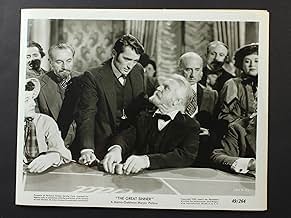Un écrivain devient un joueur compulsif lorsqu'il fait de la recherche sur le sujet. Perdant toutes ses richesses, ainsi que sa fibre morale, il commet la dégradation ultime de voler une pau... Tout lireUn écrivain devient un joueur compulsif lorsqu'il fait de la recherche sur le sujet. Perdant toutes ses richesses, ainsi que sa fibre morale, il commet la dégradation ultime de voler une pauvre boîte d'église afin de nourrir sa compulsion.Un écrivain devient un joueur compulsif lorsqu'il fait de la recherche sur le sujet. Perdant toutes ses richesses, ainsi que sa fibre morale, il commet la dégradation ultime de voler une pauvre boîte d'église afin de nourrir sa compulsion.
- Réalisation
- Scénario
- Casting principal
- Secretary
- (as Frederick Ledebur)
- Hotel Manager
- (as Ludwig Stossel)
- Valet
- (as Erno Verebes)
- Gambling Casino Patron
- (non crédité)
- Nervous Young Gambler
- (non crédité)
- Croupier
- (non crédité)
- Staring Casino Patron
- (non crédité)
- Gambling Casino Accountant
- (non crédité)
- Female Fountain Attendant
- (non crédité)
Avis à la une
I just came from a screening of a beautiful 35mm print, and I loved it! LOVED IT! Granted, the Christian allegory is laid on a bit thick at times, but the performances are wonderful, and the story will resonate with anyone mature enough to have grappled with his/her own dark side. It's a story of sacrifice and redemption, truly a battle writ large between good and evil.
I also highly suspect that Jacques Demy's BAY OF ANGELS (1963) is an homage to this film. Both use the casino as an apt metaphor for Hell, and in both films, characters are saved by love.
Siodmak is one of the great, underrated filmmakers of the 1940s, and while I don't like this film quite as much as his films noirs (The Killers, Criss-Cross) or his other masterful period drama, The Spiral Staircase, I do think The Great Sinner will satisfy anyone who appreciates the classical Hollywood style.
Which left Gregory Peck who was apparently a second choice to play the Russian writer who stops off at the gambling resort of Wiesbaden in the 1860s just before German unification. He's on his way to Paris, but one sight of Ava Gardner getting off at Wiesbaden, makes Peck decide to abruptly change his plans.
As for Ava, certainly one can understand that she's beautiful enough to let one's hormones take over, but I got the feeling Ava just wasn't into the part really, as Greg was also not. It's also hard to believe that Walter Huston had won an Oscar for his previous film, The Treasure of the Sierra Madre. To overcome a trite story, Huston overacts outrageously, pulling everything out of a ham's bag of tricks.
Even Melvyn Douglas as the scheming casino owner takes his nineteenth century villainy from the Snidely Whiplash tradition. Agnes Moorehead as the old crone of a pawnbroker also indulges in some scenery chewing, her best example of that since Dark Passage.
Best in the film in my humble opinion is Frank Morgan as the former mathematics professor and now addicted gambler. He brings a real aura of tragedy to his small role.
The Great Sinner is a sluggishly paced film with a lot of very talented people just going through the motions. For a gambling story, I'll take Casino.
Don't believe me, Wanna bet?
Le saviez-vous
- AnecdotesDeborah Kerr was initially scheduled to co-star with Gregory Peck. Then Lana Turner was slotted for the role, and then withdrawn from the production due to her extended European honeymoon with Henry J. Topping, Jr. Finally, Ava Gardner was cast in what turned out to be the first of three films to co-star the pair, along with Les Neiges du Kilimandjaro (1952) and Le Dernier Rivage (1959).
- GaffesEven though the setting of the film is established as the 1860s, everyone in this film are smoking machine made cigarettes (the cigarettes in this film clearly are NOT hand rolled cigarettes). BUT the cigarette making machine, which could make cigarettes in large quantities, was not invented until the 1880s, a couple of decades to come.
- Citations
Pauline Ostrovsky: Oh, you can count on my vanity. No matter what you say I'll regard it as a compliment.
Fedja: All right, if you insist. To one of the most corrupt women I've ever met.
Pauline Ostrovsky: Corrupt?
Fedja: Corrupt, confused, frustrated, and empty.
Pauline Ostrovsky: But in a charming sort of way, you'll admit.
Fedja: Well charm, my dear is your gambling capital. You toss it on the table like money, like everything else, even a dying grandmother.
Pauline Ostrovsky: When a man takes the trouble to be so rude to a woman, he is usually falling in love with her.
Fedja: You're not a woman. You are a symptom.
Pauline Ostrovsky: Of what?
Fedja: Of one of the worlds deadliest diseases, sophistication. More champagne?
Pauline Ostrovsky: What else am I?
Fedja: You are irritatingly beautiful.
Pauline Ostrovsky: Well, at last!
Fedja: And everything, I reject.
- ConnexionsEdited into Hollywood: The Dream Factory (1972)
Meilleurs choix
- How long is The Great Sinner?Alimenté par Alexa
Détails
Box-office
- Budget
- 2 075 000 $US (estimé)
- Durée1 heure 50 minutes
- Couleur
- Rapport de forme
- 1.37 : 1




































